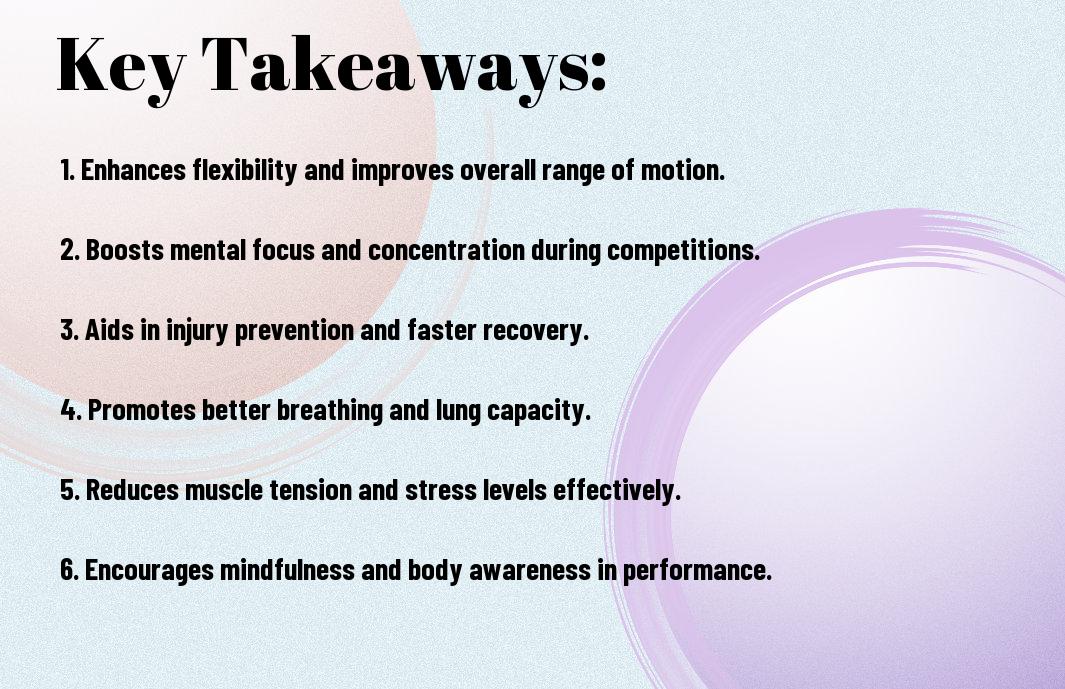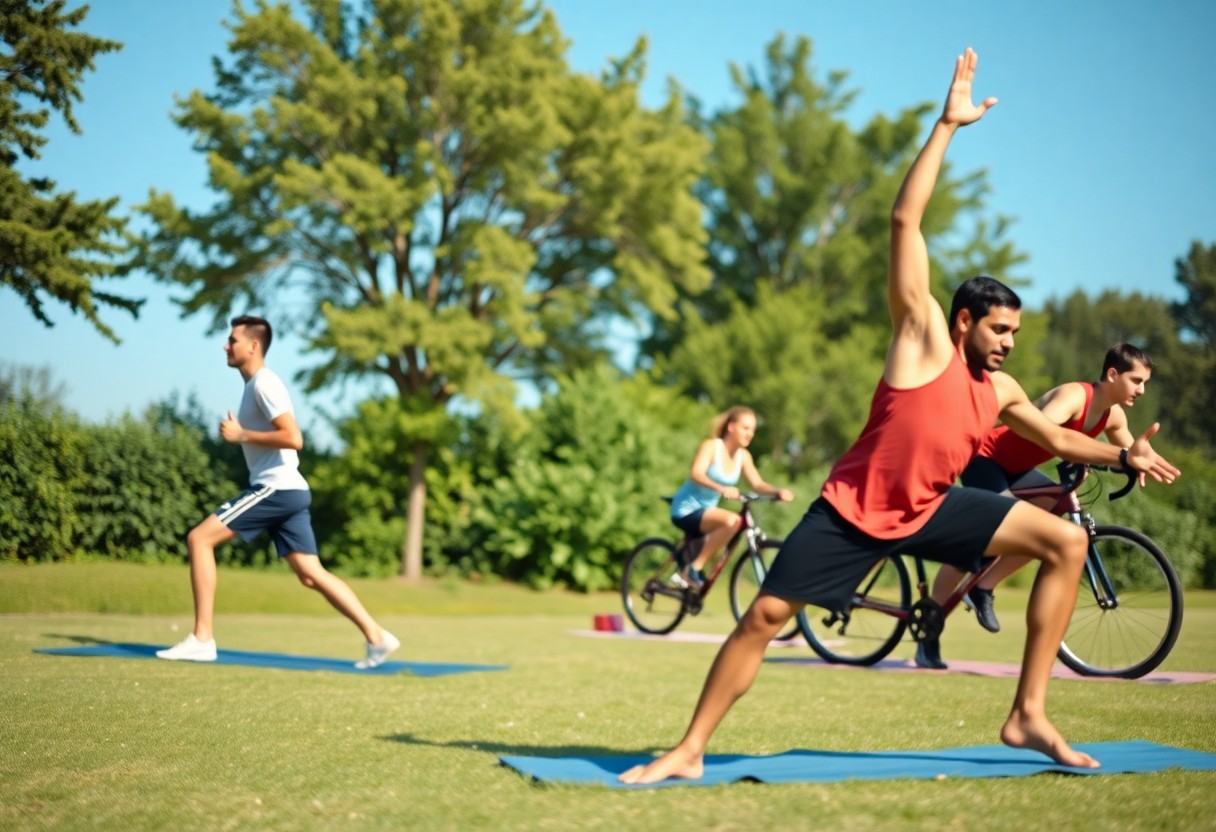You may not realize it, but incorporating yoga into your training routine can significantly enhance your athletic performance. Beyond flexibility and balance, yoga aids in injury prevention, improves mental focus, and promotes quicker recovery times. By practicing yoga, you can develop a deeper mind-body connection, which is vital for peak performance in your sport. Whether you’re a seasoned athlete or just starting out, understanding the unique benefits of yoga can help elevate your game and achieve your personal best.
Key Takeaways:
- Improved Flexibility: Yoga enhances overall flexibility, which can lead to better performance and reduced risk of injuries for athletes.
- Enhanced Focus: Practicing yoga encourages mental clarity and concentration, allowing athletes to improve their focus during competitions.
- Injury Prevention: Regular yoga practice can help identify and address muscle imbalances, contributing to fewer injuries.
- Stress Relief: Yoga effectively reduces stress and anxiety, promoting mental well-being and a more positive athletic experience.
- Breath Control: Enhanced breath control supports stamina and endurance, facilitating better overall cardiovascular performance.
Improved Flexibility
As an athlete, improved flexibility can significantly enhance your performance. Incorporating yoga into your training routine allows you to achieve greater pliability in your muscles and joints. This increased flexibility not only supports your physical capabilities but also contributes to better posture and alignment. By practicing various yoga poses, you can unlock your body’s potential and optimize your athletic prowess.
Enhancing Range of Motion
Besides improving flexibility, yoga plays a vital role in enhancing your range of motion. The diverse range of movements in yoga helps to lengthen and strengthen your muscles, promoting elasticity in your joints. This enhanced mobility can lead to improved efficiency in your athletic activities, allowing you to perform movements with greater ease and control.
Reducing Injury Risk
Flexibility is instrumental in reducing the risk of injuries. When your muscles and joints are flexible, they are less susceptible to strains and sprains during intense athletic activities. Incorporating yoga into your regimen prepares your body for the physical demands of your sport, allowing you to move through your full range of motion without restriction. This proactive approach not only extends your athletic career but also keeps you in the game longer.
Enhancing your flexibility through yoga allows for increased blood flow to your muscles, which aids recovery and reduces soreness. Improved muscle elasticity means your body can better absorb impacts and adapt to sudden movements, making you less prone to injuries. By regularly practicing yoga, you become more aware of your body’s alignment and balance, contributing to better movement patterns and further minimizing the risk of injuries related to tightness and stiffness.

Increased Strength
Even as an athlete focusing on building strength, incorporating yoga into your routine can be transformative. Yoga promotes functional strength by engaging multiple muscle groups through dynamic movements and holds. This not only enhances your overall muscle tone but also improves your power output and performance in your sport. As you deepen your practice, you’ll likely experience not only increased physical strength but also a greater mind-body connection that supports your athletic goals.
Building Core Stability
Core strength is foundational to athletic performance, and yoga places significant emphasis on developing this stability. By engaging in various asanas that target your core, you’ll strengthen your abdominal muscles, lower back, and pelvic floor, which are crucial for maintaining proper body alignment and balance during physical activities.
Supporting Muscular Endurance
An crucial aspect of athletic training is muscular endurance, and yoga can enhance this by enabling your muscles to work effectively for longer periods. The sustained holds in various poses help develop stamina by challenging your muscle fibers to resist fatigue, leading to improved performance in your primary sport.
To maximize your muscular endurance through yoga, engage in poses that require holding positions for extended durations. This practice can condition your muscles to withstand fatigue and perform better during prolonged athletic activities. Furthermore, the focus on breath control in yoga cultivates a steady oxygen flow, promoting recovery and reducing lactic acid buildup. By incorporating these techniques, you’ll find your endurance levels improving significantly during intense training and competitions.
Enhanced Mental Focus
Your mental focus is integral to achieving peak performance as an athlete. Practicing yoga cultivates a heightened state of awareness and concentration, allowing you to channel your energy more efficiently. As a result, you can improve your decision-making abilities and stay present during competitions, leading to better overall performance and reduced mental fatigue.
Mindfulness Techniques
With the incorporation of mindfulness techniques in your yoga practice, you can enhance your ability to manage distractions, both on and off the field. Techniques such as breath control and visualization help you cultivate a calmer, clearer mind, enabling you to remain focused on your goals and performance. By honing these skills, you pave the way for a more centered and effective athletic experience.
Performance Under Pressure
Enhanced mental focus through yoga prepares you to perform under pressure. The ability to stay calm in high-stress situations can significantly impact your results in competitions.
Another key advantage of yoga is its influence on your ability to maintain performance under pressure. By mastering breathing techniques and mindfulness practices, you can develop a sense of calm and composure, even in the most challenging moments. This focus allows you to execute strategies and skills effectively while minimizing anxiety, creating a competitive edge that can make all the difference in high-stakes scenarios. As a result, you’ll be better equipped to handle the pressures that come with athletic competition, ultimately leading to improved results.
Better Recovery
After intense workouts, your body needs time to heal and regain strength. Incorporating yoga into your routine aids in speeding up recovery by increasing blood flow to sore muscles, reducing inflammation, and calming the nervous system. This holistic approach enhances not only your physical recovery but also your mental resilience, allowing you to return to training refreshed and focused.
Promoting Muscle Repair
About 72 hours post-exercise is when muscle repair begins, and yoga can play a significant role in this process. The gentle stretches and movements in yoga help alleviate muscle tension, increase flexibility, and promote overall circulation, leading to faster recovery times for your body.
Stress Relief
One of the most important benefits of yoga is its ability to reduce stress, which can hinder your recovery. By practicing meditation and controlled breathing techniques during yoga, you activate the relaxation response in your body, allowing for better recovery and performance.
Relief from stress not only enhances your mental clarity but also lowers levels of cortisol, a hormone that, when elevated, can impede muscle recovery. Implementing yoga into your post-training routine creates a peaceful environment that fosters deep relaxation, helping you feel rejuvenated and prepared for your next athletic endeavor.
Injury Prevention
Many athletes overlook the importance of injury prevention in their training regimen. By incorporating yoga into your routine, you can significantly enhance your body’s resilience against injuries. Yoga helps to increase flexibility, strength, and body awareness, which are all imperative elements for maintaining peak performance while minimizing the risk of strains and overuse injuries.
Alignment and Posture
Above all, correct alignment and posture during physical activity are vital for your overall performance. Yoga teaches you to focus on your body’s alignment, ensuring that you engage the right muscles and avoid undue strain. By developing a keen sense of awareness regarding your posture, you can carry these principles into your athletic pursuits, leading to better control and reduced injury risk.
Balancing Muscle Groups
Below the surface, athletic training often emphasizes specific muscle groups, causing imbalances that can lead to injuries. Yoga provides a balanced approach, engaging both major and minor muscle groups to promote overall strength and stability. By working through various poses, you can develop greater symmetry in muscle function, allowing your body to handle stress more effectively.
Posture and imbalances can contribute to physical aches and injuries, as overworked muscles become prone to fatigue and strain. Yoga helps you identify and address these discrepancies, enhancing your performance and longevity as an athlete. By consciously working on balancing muscle groups, you can achieve a more stable foundation that supports both your training and recovery, providing a solid base for all your athletic endeavors.

Cross-Training Benefits
To enhance your athletic training regimen, incorporating yoga serves as an effective form of cross-training. This versatile practice develops flexibility, strength, and balance, which can significantly contribute to your primary athletic pursuits. By integrating yoga, you facilitate recovery, reduce injury risk, and improve muscle performance, ultimately allowing you to train harder and more consistently.
Supplementing Athletic Training
Around your dedicated training routine, yoga can be seamlessly integrated to provide a supplementary workout that focuses on the mind-body connection. Through mindful breathing and deliberate movement, you cultivate greater awareness of your body, helping you identify imbalances and areas needing improvement. This not only enriches your performance but also bolsters your overall fitness level.
Improving Overall Athletic Performance
Performance benefits from yoga extend beyond mere flexibility gains. By fostering enhanced body awareness and control, yoga helps you better understand your physical capabilities and limits. This understanding allows you to push your boundaries safely, explore new forms of movement, and unlock your full potential as an athlete.
And as you continue to implement yoga into your training, you’ll likely find improvements in endurance, strength, and mental focus during your primary sport. The breathing techniques learned through yoga sessions can also enhance your stamina during competitions, enabling you to maintain optimal performance levels. By embracing yoga, you equip yourself with tools to refine your athletic abilities and achieve your personal best.
To wrap up
From above, it’s clear that incorporating yoga into your training regimen can provide numerous benefits for your athletic performance. You can enhance your flexibility, balance, and mental focus while also aiding in recovery and injury prevention. By integrating yoga poses and practices tailored to your specific sport, you can unlock your full potential, allowing you to perform at higher levels. Embracing yoga not only strengthens your body but also cultivates a mindset that supports your athletic journey.
FAQ
Q: How can yoga improve flexibility and mobility for athletes?
A: Yoga is renowned for enhancing flexibility and mobility, which are imperative attributes for athletes in any sport. The various asanas (poses) practiced in yoga stretch and strengthen different muscle groups, promoting a wider range of motion in the joints. This increased flexibility can lead to improved performance, as athletes can execute movements more efficiently and with better technique. Additionally, the focus on breath control in yoga encourages relaxation of muscles, allowing athletes to move with greater ease and reduce the likelihood of injuries caused by tightness or stiffness.
Q: In what ways does yoga aid in mental focus and concentration for athletes?
A: Mental focus is a key performance factor for athletes, and yoga provides effective techniques to enhance concentration. Through practices such as mindfulness and meditation incorporated into yoga routines, athletes learn to direct their attention and manage distractions. The discipline of maintaining poses while focusing on breath creates a state of mental clarity, which can be beneficial during high-pressure situations in competition. Furthermore, the calming nature of yoga can help in reducing anxiety and stress, allowing athletes to perform at their best by maintaining a balanced and composed mindset.
Q: How does yoga contribute to injury prevention for athletes?
A: Practicing yoga regularly can significantly reduce the risk of injuries in athletes by promoting balanced muscle strength and encouraging proper alignment. The extensive stretching involved in yoga helps alleviate muscle tension and improves circulation, which is vital for recovery after intense training. Additionally, the awareness developed through yoga helps athletes understand their bodies better, enabling them to recognize when they are overexerting themselves or when certain movements may lead to injury. This proactive approach to body awareness and alignment assists in safeguarding athletes from both acute and chronic injuries during their training and competitions.


